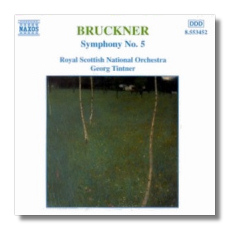
The Internet's Premier Classical Music Source
Related Links
- Bruckner Reviews
- Latest Reviews
- More Reviews
-
By Composer
-
Collections
DVD & Blu-ray
Books
Concert Reviews
Articles/Interviews
Software
Audio
Search Amazon
Recommended Links
Site News
 CD Review
CD Review
Anton Bruckner

Symphony #5 in B Flat Major
Royal Scottish National Orchestra/Georg Tintner
Naxos 8.553452 DDD 76:46
Every few years, it would appear, another great septuagenarian or even octogenarian conductor suddenly pops up as if from nowhere to impress us with his grasp of the great Austro-German symphonic repertoire.
The latest in this line, or so it would seem, is Georg Tintner, well known in New Zealand and in Canada (where he has worked a good deal with the National Youth Orchestra), but scarcely heard of elsewhere.
That situation should soon come to an end; connoisseurs may have known of Tintner's way with Bruckner for some years, but for the rest of the world this disc may come as a revelation.
And revelation for two reasons: firstly, despite having been in his grave these 101 years, Bruckner remains a controversial composer. His massive symphonies, for some a mountain range of stupendous peaks, are still, for many, tedious exercises in repetition.
Secondly, of all Bruckner's symphonies, it is the Fifth – performed (heavily cut) just once in Bruckner's lifetime, when he was too ill to attend – which is the toughest nut to crack. Not for nothing did (I believe) the late Deryck Cooke refer to the "essential visionary dreariness" of the work.
Hats off to Naxos, then, for launching their complete Bruckner cycle with this central work, a work which the composer himself sometimes referred to as his Fantastic and which culminates in the greatest marriage of fugue and sonata form in a symphonic work since Mozart's Jupiter Symphony almost exactly a century earlier.
Although a few of us who are fortunate enough to possess one of Tintner's earlier Bruckner (there is an undeservedly obscure German release of the 6th and an old National Youth Orchestra of Canada LP recording of the first version of the 8th) were already aware that Tintner's stature as a Bruckner conductor was something out of the ordinary, now, thanks to the awesome selling power of Naxos, not only Tintner, but Bruckner too, is likely to become a more familiar name around the world.
For let there be no mistaking this: Tintner is a great Bruckner conductor in the grand manner. Less wilful than Furtwängler or (Eugen) Jochum, he brings more of the classic grandeur we normally associate with Horenstein.
He paces this performance with an extreme sureness of step; in fact it builds inevitably from the plodding downward tread of the opening double bass line, to the magnificent culmination of the finale.
Nor is Tintner afraid to linger a little over the more lyrical portions of the score – and, despite all the naYsaÿers, there are plenty of these. Moreover, he refuses to let the brass dominate at the cost of all other detail, something a few other conductors might learn from, in Bruckner and elsewhere.
Ultimately, I would not claim that this is a performance to displace the classic accounts of the work – Furtwängler (1942), Georg Ludwig Jochum (1944), Eugen Jochum (1958), Konwitschny (1961), Schuricht (1963), Horenstein (1971), to name just a few I should hate to live without – but they are mainly in dated or less-than-perfect sound. The only truly great Fifth I know of in first class modern sound is by Takashi Asahina on a very expensive Japanese import disc.
The RSNO play extremely well, although the overall sound is a little on the lightweight side – a combination, I suspect, of orchestra and recording. Consequently the final pages don't quite have the overwhelming force that we hear from others (imagine what Tintner could do with this piece with the VPO or Concertgebouw, say), but there is no lack of grandeur or excitement.
Future installments of Tintner's cycle, I gather, will include some relative rarities, such as William Carragan's edition of the 1872 (first) version of the 2nd, currently only available in the Camerata set under Eichhorn.
But the great thing about this CD is that we have the first installment of a new cycle, in good sound, played by a very good orchestra under a great Brucknerian.
The beginning collector or Bruckner neophyte need have no fear that, by buying "budget" they are getting anything less than a first-class, thoroughly idiomatic account.
A most auspicious opening to an important new series.
Copyright © 1998, Deryk Barker


















